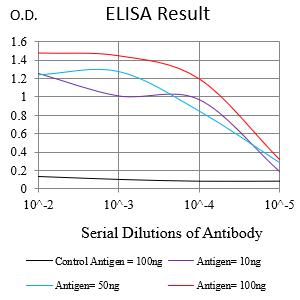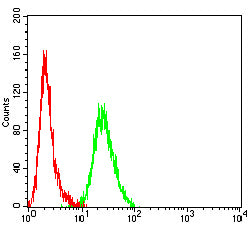

| WB | 咨询技术 | Human,Mouse,Rat |
| IF | 咨询技术 | Human,Mouse,Rat |
| IHC | 咨询技术 | Human,Mouse,Rat |
| ICC | 技术咨询 | Human,Mouse,Rat |
| FCM | 1/200 - 1/400 | Human,Mouse,Rat |
| Elisa | 1/10000 | Human,Mouse,Rat |
| Aliases | PBT; SCFR; C-Kit; CD117; MASTC |
| Entrez GeneID | 3815 |
| clone | 3C1C7 |
| WB Predicted band size | 110kDa |
| Host/Isotype | Mouse IgG1 |
| Antibody Type | Primary antibody |
| Storage | Store at 4°C short term. Aliquot and store at -20°C long term. Avoid freeze/thaw cycles. |
| Species Reactivity | Human |
| Immunogen | Purified recombinant fragment of human KIT (AA: 23-322) expressed in E. Coli. |
| Formulation | Purified antibody in PBS with 0.05% sodium azide |
+ +
以下是关于KIT抗体的3篇代表性文献摘要简述:
1. **《KIT and PDGFRA mutations in gastrointestinal stromal tumors: implications for diagnosis and therapy》**
- **作者**: Heinrich, M.C. et al. (2003)
- **摘要**: 研究分析了胃肠道间质瘤(GIST)中KIT和PDGFRA基因的突变模式,发现突变类型与肿瘤对靶向药物(如伊马替尼)的敏感性相关,为临床个体化治疗提供了分子依据。
2. **《Gain-of-function mutations of c-kit in human gastrointestinal stromal tumors》**
- **作者**: Hirota, S. et al. (1998)
- **摘要**: 首次揭示了KIT基因的功能获得性突变是GIST发生的关键驱动因素,为KIT抗体在肿瘤免疫组化诊断及靶向治疗中的应用奠定了基础。
3. **《Characterization of a novel anti-KIT antibody for immunohistochemical detection of formalin-fixed paraffin-embedded tissues》**
- **作者**: Dako (现Agilent) 技术手册 (示例文献)
- **摘要**: 描述了商业化KIT抗体(如CD117)的开发和验证,证明其在福尔马林固定组织中对KIT蛋白的高特异性和敏感性,推动了其在病理诊断中的标准化应用。
*注:上述为简化摘要,实际文献需通过数据库(如PubMed)检索原文。如需具体文献DOI或年份修正,请提供更详细信息。*
KIT antibody targets the KIT protein, a transmembrane receptor tyrosine kinase encoded by the *KIT* proto-oncogene. KIT, also known as CD117. binds to stem cell factor (SCF) and activates downstream signaling pathways (e.g., MAPK, PI3K/AKT) that regulate cell proliferation, survival, differentiation, and migration. It is critical for normal hematopoiesis, melanogenesis, and gastrointestinal stromal cell development.
KIT gain-of-function mutations or overexpression drive oncogenesis in several cancers, including gastrointestinal stromal tumors (GISTs), acute myeloid leukemia (AML), mastocytosis, and melanoma. In GISTs, ~80% of cases exhibit *KIT* mutations, making KIT a key diagnostic and therapeutic marker. KIT antibodies are widely used in immunohistochemistry (IHC) to confirm diagnoses, particularly in distinguishing GISTs from other soft tissue tumors.
Therapeutically, KIT inhibitors (e.g., imatinib) are first-line treatments for metastatic GISTs. However, secondary mutations often cause resistance, necessitating KIT antibody-based assays to monitor mutation status and guide therapy. Research also explores KIT-targeted therapies in other malignancies and regenerative medicine (e.g., stem cell maintenance).
In summary, KIT antibodies serve as vital tools in diagnostics, prognostics, and therapeutic development, reflecting KIT's central role in both normal physiology and disease.
×